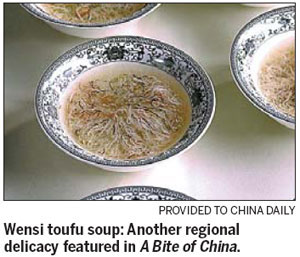Life-changing awakening
Where people usually plant flowers, Zhang had planted a variety of vegetables - melons, pumpkin, tomato and eggplant.
As a member of the Roof Gardens Association, Zhang says his rooftop vegetable garden has inspired a lot of people in China to cultivate gardens on their rooftops.
Many come to learn from him.
"People want to return to Nature, and they aspire to be urban farmers," he says. "There used to be virtual vegetable planting games on the Internet, but now people prefer the real thing."
A Bite of China also awakened a renewed appreciation of traditional and regional Chinese foods since it aired in May.
People not only got to know many ingredients previously used only locally, and they were warmed by the strong bonds that link Chinese food, family and hometown.
Bian Jiang, secretary-general of the China Cuisine Association, says the documentary is about Chinese food, but goes beyond food in that it also expressed Chinese culture and identity.
"The documentary takes people back to where they feel happiest: To home-cooked food, to mother's cooking.
At the same time, it also showcases regional foods, the best memories for the hundreds of thousands of Chinese people who have traveled far from their hometowns to work and live in the cities," he says.
The documentary motivated buying sprees on the Internet - for Yunnan's black truffles and its Nuodeng ham, and Jianshui's fermented bean curd. The country's biggest Internet business portal reported increased transactions of produce that had been featured on the documentary.
Regional cuisine styles such as those from Yunnan and Anhui provinces became more popular, and many restaurants borrowed the catch phrase from the TV series by boasting about "A Bite of Hangzhou", or "A Bite of Henan".
Xibei Oats Village, a northwest Chinese specialist restaurant, has appointed Huang Guosheng as its image ambassador.

Huang is a country farmer and millet bread baker who had appeared in A Bite of China. The episode showed him milling the flour, kneading the dough and steaming the bread before cycling to the nearest city with his freshly made buns.
Chain restaurant Xibei paid him 300,000 yuan ($48,116) as its spokesman, and invited him to teach its chefs how to make his millet bread, now available at all its outlets in the country at 3 yuan per loaf.
Although some critics say millet bread is only authentic in northern Shaanxi, where Huang comes from, Huang seems to have benefited from the deal.
He said he would build a big house with the money, so his family members can all live under one roof.
Chong Zhanming, who determines the professional skills of chefs in Beijing, says A Bite of China has inspired a love for traditional food while deepening the understanding of regional ingredients among chefs.
Bian Jiang says that the TV series was so successful because it puts human faces to the food stories.
"The Chinese attitude to food has changed, a reflection of better living conditions. People have gone from just feeding a hunger to gourmet enjoyment," Bian says. "That is why restaurants need to raise the cultural connections and quality of food to satisfy customers."
















